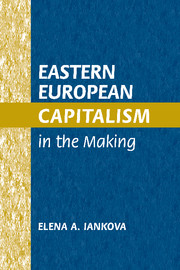Book contents
- Frontmatter
- Contents
- Acknowledgments
- List of Abbreviations
- 1 Hybrid Capitalism in the Making
- 2 The Corporatist Legacy of State Socialism
- 3 Bulgaria's National Tripartism
- 4 National Social Dialogue in Poland
- 5 The Politics of Sectoral Tripartism
- 6 The Politics of Regional Tripartism
- 7 Conclusions: Transiency and Continuity
- Tables
- References
- Index
3 - Bulgaria's National Tripartism
Published online by Cambridge University Press: 30 July 2009
- Frontmatter
- Contents
- Acknowledgments
- List of Abbreviations
- 1 Hybrid Capitalism in the Making
- 2 The Corporatist Legacy of State Socialism
- 3 Bulgaria's National Tripartism
- 4 National Social Dialogue in Poland
- 5 The Politics of Sectoral Tripartism
- 6 The Politics of Regional Tripartism
- 7 Conclusions: Transiency and Continuity
- Tables
- References
- Index
Summary
Socialist Persistence, Economic Crisis, and Emergence of Social Dialogue
Elitist Extrication from State Socialism
In the 1970s and 1980s, Bulgaria, which arguably had the strongest economy and one of the least liberalized political regimes in Eastern Europe, avoided the ferment against state socialism that troubled other countries in the region. Bulgaria was the only socialist state whose regime never succumbed to the temptation to deviate from Soviet directives in any policy dimension — political, economic, or cultural; domestic or foreign (Brown 1970; Bell 1986; Rothschild and Wingfield 2000: 211—17). Bulgaria's unstrained relationship with the Soviet Union had favored its specialization within the Council for Mutual Economic Assistance (CMEA) in high-tech industries such as computers, electronics, transport, and nuclear energy, and it had eventually earned a reputation as the “Eastern European Japan” and the “Japan of the Balkans” (Ramet 1991: 12). From 1976 through 1980, Bulgaria's rate of growth in national income was 6.1 percent, compared with 1.6 percent in Poland, 3.7 percent in Czechoslovakia, and 3.2 percent in Hungary. Its foreign debt of $6 billion in late 1988 was smaller than that of any other Soviet bloc country. In contrast, Poland owed $32 billion to Western countries and $5 billion in transferable rubles to the CMEA states as of late 1987, and was compelled to use 67 percent of its export earnings to service these debts (Ramet 1991: 15).
- Type
- Chapter
- Information
- Eastern European Capitalism in the Making , pp. 52 - 91Publisher: Cambridge University PressPrint publication year: 2002



